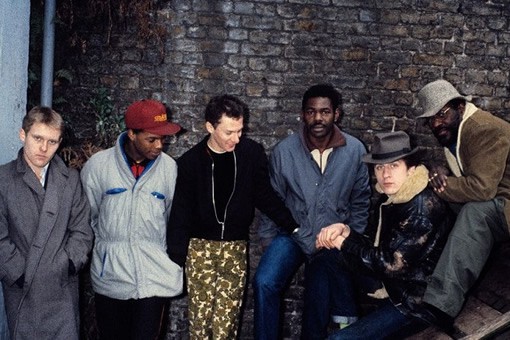Concert Review: The English Beat at Lowell Summer Music Series
By Karen Schlosberg
Mainstay singer/songwriter/guitarist Dave Wakeling and the band were in fine form in Lowell, whipping through a hit-laden 90-minute set to an enthusiastic crowd.

The English Beat. Photo: courtesy of the artist.
The English Beat has always embraced both love and social justice in its music, from joy to anger. Now in its 40th year, the Birmingham, England-bred band was born in the punk movement but based its messages and beats in ska (the Jamaican precursor to reggae that blended styled of mento, calypso, and American jazz and R&B), to form what was called the two-tone movement in England. The result was highly danceable and lyrically edgy.
Though the band has gone through musical changes since its inception, including the spin-off band General Public, its mainstay has always been singer/songwriter/guitarist Dave Wakeling, and he and the band were in fine form in Lowell, whipping through a hit-laden 90-minute set to an enthusiastic crowd at Boarding House Park. The set started with a trio of songs the band’s first album, I Just Can’t Stop It (1980)—“Rough Rider,” “Twist & Crawl,” and “Hands Off … She’s Mine”—establishing a tone that leaned more on danceability than on edginess (no “Two Swords” or “All Out to Get You”), which fit the atmosphere of the lovely summer night. The one exception was “Whine and Grine/Stand Down Margaret,” an old favorite anti-Thatcher protest that Wakeling said always goes down well in the Boston area.
The set also dipped into the Beat’s other two studio albums, Wha’ppen and Special Beat Service, plus General Public’s All the Rage. From the propulsive “Too Nice to Talk To,” “I Confess” and “Mirror in the Bathroom” (with a welcome sing-along led by toaster Antonee First Class) to the soaring and incandescent “Tenderness” and “Save It for Later,” the band provided a powerful foundation for Wakeling and Antonee First Class to wind vocals around melody lines, particularly on the band’s covers of “Can’t Get Used to Losing You” (a 1963 hit for Andy Williams) and the Staple Singers’ 1972 hit “I’ll Take You There.” Wakeling’s Vox Teardrop guitars lay a distinctive chunky texture to the sound, rounded off by keyboard players Minh Quan and Kevin Lum, bassist Chuck Elder, drummer Brian Cantrell, and dexterous sax player Matt Morrish, whose lines created lovely counterparts to the vocals.
Karen Schlosberg is a veteran journalist and editor. Her work has appeared in such publications as The Boston Herald, The Boston Phoenix, Rolling Stone, Musician, Creem, and Trouser Press. She can be reached here or on Twitter @karen1055.
Tagged: Karen Schlosberg, Lowell Summer Music Series
